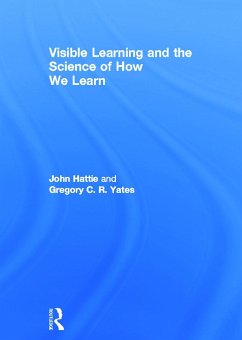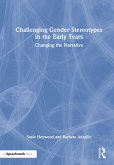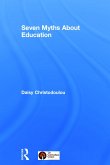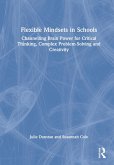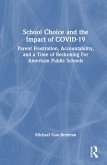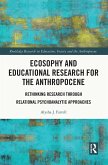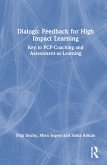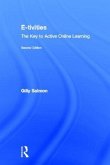In this latest book, John Hattie has joined forces with cognitive psychologist Greg Yates to build on the original data and legacy of the Visible Learning project, showing how it's underlying ideas and the cutting edge of cognitive science can form a powerful and complimentary framework for shaping learning in the classroom and beyond. Visible Learning and the Science of Learning explains the major principles and strategies of learning, outlining why it can be so hard sometimes, and yet easy on other occasions. Aimed at teachers and students, it is written in an accessible and engaging style and can be read cover to cover, or used on a chapter-by-chapter basis for essay writing or staff development.
Hinweis: Dieser Artikel kann nur an eine deutsche Lieferadresse ausgeliefert werden.
Hinweis: Dieser Artikel kann nur an eine deutsche Lieferadresse ausgeliefert werden.
"The book is full of useful insights and ideas and is both readable and accessible. I recommend it to teacher trainees as well as trained teachers for continuing professional development and reflective practice." - Helen Williams, Teacher Training Co-ordinator at West Herts College and an Institute for Learning Fellow
"This book should be on the compulsory reading list for all students undertaking teacher education courses in Australia and elsewhere. In addition, it will be of great value to teachers who are already serving because they can now access essential information about learning and teaching that was almost certainly neglected in the methodology courses they undertook in their pre-service years. A third group of educators who would benefit greatly from exposure to the book are the teacher-educators who currently deliver such methodology courses." - Peter Westwood, freelance writer and editor, Australian Journal of Learning Difficulties
"There is so much of interest here that you will find it difficult to put this book down. The questions are timely and relevant, and the answers, while often surprising, occassionally irritating, and sometimes amazing, are always worth knowing." - Graeme Whyte, Rudolf Steiner Schools, Special Children Magazine
"...this book is an accessible collection of engaging examples drawn from a broad body of cognitive, social and even biological (see the section on mirror neurons) psychology research with important implications for teaching and learning. 'The strength of this book lies in its fascinating cast of research characters; chameleons, gorillas, and monkeys all have their parts to play in helping the reader understand and apply principles of learning. 'The book has helpful pedagogical strategies embedded throughout and is most appropriate for readers new to this area of research. Experts who are familiar with the basic tenets of cognitive psychology or who closely follow current developments in the scholarship of teaching and learning may find many of the examples familiar, however with such a broad array of research presented, even seasoned researchers will likely find something new to explore." - Melissa Birkett, Department of Psychology, Nortern Arizona University, Psychology Leaning and Teaching
"This is a worthwhile and useful volume. It covers the field of what makes teachers effective in the classroom. Its strength is in (1) making often complex concepts accessible in both writing and the format of the book; (2) providing balanced, research-informed coverage of concepts related to the complex acts of teaching and learning, and (3) helping teachers and instructors make the shift from over-focusing on the teaching act to appreciation and understanding of the process of learning as experienced by students." - Reflective Teaching
"This book should be on the compulsory reading list for all students undertaking teacher education courses in Australia and elsewhere. In addition, it will be of great value to teachers who are already serving because they can now access essential information about learning and teaching that was almost certainly neglected in the methodology courses they undertook in their pre-service years. A third group of educators who would benefit greatly from exposure to the book are the teacher-educators who currently deliver such methodology courses." - Peter Westwood, freelance writer and editor, Australian Journal of Learning Difficulties
"There is so much of interest here that you will find it difficult to put this book down. The questions are timely and relevant, and the answers, while often surprising, occassionally irritating, and sometimes amazing, are always worth knowing." - Graeme Whyte, Rudolf Steiner Schools, Special Children Magazine
"...this book is an accessible collection of engaging examples drawn from a broad body of cognitive, social and even biological (see the section on mirror neurons) psychology research with important implications for teaching and learning. 'The strength of this book lies in its fascinating cast of research characters; chameleons, gorillas, and monkeys all have their parts to play in helping the reader understand and apply principles of learning. 'The book has helpful pedagogical strategies embedded throughout and is most appropriate for readers new to this area of research. Experts who are familiar with the basic tenets of cognitive psychology or who closely follow current developments in the scholarship of teaching and learning may find many of the examples familiar, however with such a broad array of research presented, even seasoned researchers will likely find something new to explore." - Melissa Birkett, Department of Psychology, Nortern Arizona University, Psychology Leaning and Teaching
"This is a worthwhile and useful volume. It covers the field of what makes teachers effective in the classroom. Its strength is in (1) making often complex concepts accessible in both writing and the format of the book; (2) providing balanced, research-informed coverage of concepts related to the complex acts of teaching and learning, and (3) helping teachers and instructors make the shift from over-focusing on the teaching act to appreciation and understanding of the process of learning as experienced by students." - Reflective Teaching

